Post-China Post 2
Post-China Post 2
By 鲁科
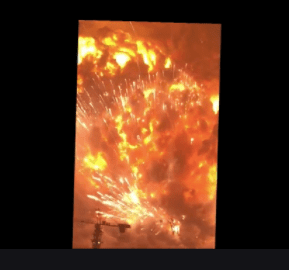
It was August in 2015. I had been in the country a year. The apartment I lived in with two flatmates had a long, curving balcony, hugging half our shared space like a visor around a face. From it we looked out at a nightscape of southwest Shanghai, at many lights and different neighbourhoods, but few landmarks. A pair of towers in Xuhui that were nicknamed the ‘Lipsticks’ could be seen from it, but little else that you could put a name to. It was almost irresistible to smoke there. Cigarettes costing nothing, we would leave packs on the loose marble shelf with lighters, and indiscriminately take from them. This was a place to consider what might be out there, among those towers.
***
The explosions of 12 August in Tianjin looked like pictures from the dream of someone who longs to create the perfect explosion. From an agitated fire there came a chain of exponentially growing events. We watched them on our phones and computers. The biggest of the fireballs was an awesome creation. With a shattering sound it spattered some kind of burning liquid and unpeeled upwards, lifting on fire-stalks and smoke-stalks out of a dark space. The space turned out to be container storage, near the port of Tianjin. The name of the company was Ruihai International Logistics. A chemical fire in the Ruihai International Logistics Hazardous Goods Warehouse, preceding the explosions, had pulled in firefighters, and 99 were obliterated, along with almost a dozen police and 55 civilians, the soft materials and glass in thousands of cars and the windows of apartments up to ten kilometers away. 800 people were injured.
Here, some foreigners are watching from their window. First, they are elated, they are watching something important happening nearby. The first explosion.
American woman: Did you get that?
American man: Fuck yeah, I’m videoing it. What the fuck?
Then the bigger event. They realize it is a thing potentially happening to them.
They run away, down the blacked-out stairwell in their tower.
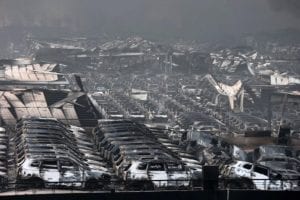 It registered on China’s seismographs and left a crater. Among the chemicals kept there was sodium cyanide, hundreds of tons. Fearful of contamination, local citizens shared ideas on what was in the containers. They were chastised by their governmental parent. Online chatter was curtailed. They could hardly be blamed for wanting information. But who was to know what was in the containers really? The authorities hadn’t, but that was hardly so exceptional. Most containers don’t get looked at until the transaction is done. We don’t even know how many there are in the world.
It registered on China’s seismographs and left a crater. Among the chemicals kept there was sodium cyanide, hundreds of tons. Fearful of contamination, local citizens shared ideas on what was in the containers. They were chastised by their governmental parent. Online chatter was curtailed. They could hardly be blamed for wanting information. But who was to know what was in the containers really? The authorities hadn’t, but that was hardly so exceptional. Most containers don’t get looked at until the transaction is done. We don’t even know how many there are in the world.
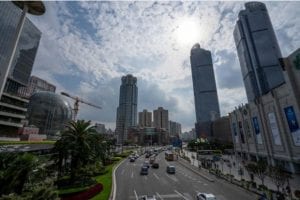
I would have watched that video from Tianjin in the living room and then gone to the balcony. Looking out, at nearby towers and lights that foregrounded the everlasting reaches of other towers and lights, I would not have been too surprised to see one of the little candles flicker and explode. Why wouldn’t just one of them be snuffed out as I watched? There was the law of averages and that.
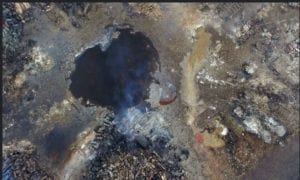
Yet Tianjin. Here was a thing that had definitely happened, but it was better just to look at the footage. Not to scan through explanations of events, approved or otherwise. Just to look at the fireball over and over was the thing to do, it being so unique, such an almighty fuck-up, the crater afterwards looking like a Satanic finger had jammed into the city from the clouds above.
At the start of that same Summer, another event: The Oriental Star, a Yangtze cruise ship, sank as it was navigating the river upstream to Chongqing. It capsized in Hubei province, near Jianli. Despite a rescue effort with 90 boats, and Premier Li Keqiang ordering the Three Gorges Dam to reduce its flow, only 12 of the 454 people on the ship survived. Hongyi Lai writes, in ‘China’s Governance Model: Flexibility and Durability of Pragmatic Authoritarianism,’ that the CCP had previously (2003-2007)
… made unprecedented progress in overhauling and improving its crisis management institutions. Prior to 2003, [they] were fragmented and concentrated in a few sectors that were not prone to crises. China had no comprehensive national multi-level crisis management system. The vulnerability … was exposed in the SARS epidemic. In the early months of the SARS outbreak the epidemic management was secretive … and poorly executed. The mismanagement of SARS undermined the reputation of the state outside and within China.
The writer discusses both Ruihai and the shipwreck. He wants to say that the fast responses show evidence of changes in the system. The intervention to modulate the pressure at the Three Gorges Dam impresses him. Yet in both cases, large death tolls occurred. In the case of the Tianjin explosion, partly because of the hurried response, 99 firefighters, all sent in at once. Solving problems with surges of personnel is a well-known compulsion of the leadership. A more everyman hubris, of cost-cutting so extreme as to look like brinkmanship, and ersatz materials put into play where the best is needed, was also present at both.
The writer picks up on a culture of corporate irresponsibility.
It was reported that the body of the ill-fated ship had been extended in order to take in more passengers and generate more revenue. This might have changed the center of gravity of the ship and made it unstable and prone to capsize. In addition, the fact that in highly stormy weather the captain of the ship continued the journey instead of finding a safe place to dock has raised questions about the practice of the sailors and the shipping company.
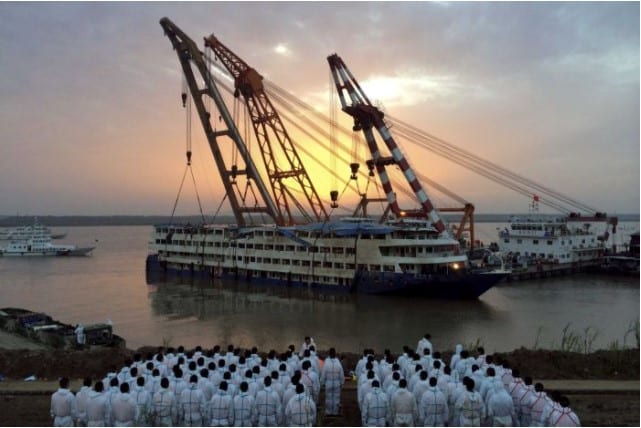
The Ruihai International Logistics Company had permission to store ten tons of Sodium Cyanide, writes Hongyi, but might have had seven hundred. Calcium carbide, used in steelmaking, miners’ lamps and fertilizers, was also detonated. When the firefighters came they ‘couldn’t find anyone’ to tell them what was inside. They used water, which might have been what triggered the explosion.
That the fire was in the Binhai New District, a special economic zone primed to boost Beijing’s economy, was ‘ironic,’ Hongyi continues. The BND ‘hosts some of the largest petrochemical facilities in the nation,’ yet underneath the ‘rushed push for high growth has been an alarming neglect of codes of safety … by some of the big firms.’ A downside of ‘pro-growth authoritarianism,’ he concludes, is that if ‘rules, health and the environment’ become expendable, the whole will be ‘unstable, and will entail high social costs.’
Yet, looking back at these catastrophes, I see cultural habits that precede the current governance model and the ongoing wealth frenzy.
I think of all the times I saw the agile, coin-shaving dexterity of one Chinese hand undermined by the fumbling of another.
One of the local geniuses must be called a substitution genius, one that covers both the urge to adulterate and fake and the instinct to rely on fast and makeshift solutions to problems.
The kingdom of meticulous counters is also the home of Mr Chabuduo.
These are older currents than the current governance model and have to do with the muted ways that the people have eternally gone about extracting a maximum of value from substances and circumstances to hand.
As with everything over there, these disaster stories have the afterglow of the miracle, of the near-billion extracted from poverty in half a lifetime.
As with everything to do with the miracle, there is the sound of the earth’s materials creaking and the feel of its tissues under terrible strain.
Tianjin, the main port servicing the capital, processes half a billion tons of cargo a year.
***
I had expected it to be a place of shocks. But the shocks weren’t in your face.
They slid past in textures and soft sounds.
I remember the many green shades, green paint on iron railings. Being surprised by the suffusion of parks and leaves through so much of it. My head tilting to follow the crawling plants fluttering on the sides of a massive cylinder under a motorway flyover.
There was a balcony, right at the beginning. Through a Canadian friend, known from college years before, I came to a party full of her expat mates and their extended circle, right after I came from the airport.
It was in one of those early twentieth-century blocks of flats, inside a little complex in Xuhui or Changing, with no elevator, raw concrete stairs and dust. You entered through a green metal gate on the ground floor. Families used the corridors for storage. You scanned their tied bundles of old magazines, avoided brushing on their grimy bric-a-brac as you crawled to the relevant floor, past phone numbers stenciled onto the walls by people offering work.
We found Westerners and Shanghainese laughing and smoking on the fourth floor, hiding in the side-lit stairwell that was open to the city air and the sky without stars. A Scottish guy was there. He was saying how much he loved China. He was proud to outline to us how he directed his masseuses to give him hand-jobs. (‘They make you wear these paper underpants, right, I just tear a hole in ‘em. They get the message aye.’) Scotland had just rejected independence the day before. We spoke about it and he started cursing. He seemed proper sad.
The candleflame colour of lights from the rooms and balconies of other apartments, in the near, middle and far distance, made up the layers of a nighttime that was lit only from below. I could see it behind him, through the aperture in the grey wall, beyond the dirty green metal railing that he was leaning on.
I would always take the chance to go to a balcony and smoke at parties, just to look at it, it being so much bigger than anything similar I’d known.
I met Nora, whose place it was. She was the Chinese girlfriend of Tim, an American copywriter. I wanted to be a copywriter too. Nora jumped into the doorway, smiled at us all and turned back into her party. We continued through the panelled metal door, into the kitchen where I met Jack McDonnell, an English copy-editor and amateur actor, from Manchester, of Irish parents. Jack was nearly fifty. He was preaching, with a finger raised in the air, about the ‘Guardian newspaper’ and how it had failed to address the Rotherham rape gangs. His eyes rolling and finger lifting higher, he tried to capture people for his speeches. They would slip away, and he would look up and notice the last remaining listener.
‘You! You are different, because you understand!’ His finger pivoted down and touched my chest. Nadia would call him the saddest man in Shanghai. Nadia was at the back of the party. She left early that night.
She was busy. She was about to produce her play, just a single performance after years of writing. And then she would leave, to go back to America to be with her mother, who was dying.
One of the fastest shocks was to meet Nadia just as she was departing. In the three months to come, the length of that first tourist visa I had used to enter, I had the impression of moving behind her all the time.
Nadia was always ahead of me, her head positioned over her feet so she risked tottering over, jabbering about everything that I would need to know.
She was tall, with feathery hair that she might have cut herself. Her fingertips moved while she spoke, like a hairdresser with invisible scissors. She wore a lumpy cotton hat that I didn’t like and had long coats and cotton blouses that her thin shoulders would make elegant. One immigrant grandparent had been an Iraqi and this had helped to give her a dark, immobilizing gaze from under coffee-shaded eyelids. Together with her smile, her fast and giddy voice, these eyes had made sure that she had never had to work hard to be attractive.
She was strong and whimsical, interested in others, with edges of impatience. I thought she seemed popular with the kind of people I wanted to meet.
At what point did she jump up and accuse me of using her? She shouted that it wasn’t the first time it had happened. She had helped new people before and they had sucked her spirit out, they couldn’t help it. When people arrived they were needy.
I was waiting on some extra money from home and a first payday from the job I had started. She bought me a burrito and ran away from the burrito stand without finishing hers, because it seemed (at that moment) I was a user.
She called the next day, apologizing. We took taxis here and there. I had not seen someone take a taxi so emphatically, falling into the back and managing to shout in a girlish yet abrasive voice (her special thing), telling the driver the name of the destination, three or four times, saying sorry and shoving me over (saying ‘scoot!’), before settling into her seat.
She clutched her little feathery fringe and grabbed her forehead with long fingers.
I followed her down the small, frenetic bar street in the former French concession, Yongkang Lu. She walked quickly, her eyes ahead, so as not to be troubled by people she knew, particularly alert for the ‘Frenchies’. I pointed out that it was, after all, the former French Concession.
‘No! My ex might be here with his coked up Froggie friends. Avoid!’ She held up a finger in my face, like Jack. Neither of us wanted coke.
She called that little street of bars the ‘catwalk’. Because parading down the middle was the best way to be found by your friends or picked up by a stranger. Her ex and his coked-up froggies had disgraceful stories. One of them liked to visit a place where the girl descended from the ceiling wrapped in an ‘aerial silk’ band, like a performer at that lame French-Canadian circus. She would put your dick in her mouth and spin around, like a worm un-cocooning itself.
‘You laugh but it’s real! It’s called the helicopter! I keep trying to get them to pay more. Those women don’t make nearly enough …’
She hurried me to goodbye dinners with her friends, to listen to music and drink beers in her shared studio space that she was clearing out. She had had men and women over her eight years. French of both kinds. At her place she showed pictures of her cherished last one, a ‘totally insane’ girlfriend, who in the photo beamed venom at the lens as it were a rival for the affections of the Nadia she touched with adoring hands, in that froggy way. After what dinner did Nadia scowl at me and accuse me of trying to get her contacts from her? Of wanting to inherit her network after her departure. Being thus far more interested in her than her friends, I told her I didn’t get it.
Nadia’s apartment was mostly empty. Because she was leaving, or because she preferred to keep it this way, was unclear. She showed me how to endure, after hurrying across the city in a day.
You close the door.
You put down a sheet and a pillow.
You put on some classical music.
You lie on the ground and you listen to it.
Her mother had been a Scientologist. The godawful sci-fi writer who created that religion to enrich himself appeared on her Youtube when I entered his name into it, looking for an interview.
It was a BBC interview with him, from the 1950s, on his boat. The English interviewer succeeds in framing the eccentric guru’s mendacity and narcissism. But she couldn’t watch it with me.
‘I don’t want to watch that recording. Turn it off, please. Please!’
Still, Scientology, the idiot futurism, had left some facility in her. A way of paying attention and controlling the conversation. She would show me with her eyes, which I liked to stare into anyway.
‘You really want me to do it?’
‘Yes. Are you doing it now? Yes. It’s creepy …’
She woke up gasping and kicked me out of bed: ‘I can’t do this!’
I lay down, pissed off, on the floor near her desk, hearing the insistent noises. I still hadn’t been paid nor found my own place. She was right though. It was all too fast, as the future is. I slept. Was it then I dreamt of mammoths? They might have been transformed versions of the ships that endlessly pulled coal and ore along the ugly Huang Pu, in one direction only. I dreamt of mammoths walking into the sea because they had realized that the ice age was over.
I would have gone along the haunted motorway, in the dream, the motorway of Yan’an road that felt haunted in real life, too – maybe because of the way it had been built, so decisively rammed through the thoroughfare that would have joined the old bund waterfront to colonial residences of the French Concession, racecourses and eventual countryside in the old days.
The new civic planning of Shanghai seemed to have been conceived in some Feng Shui attitude of exorcism towards a colonial past that wouldn’t dissolve.
As a kid, a long time before I learned about JG Ballard, I would look out at motorway islands and wonder that people were not stranded on them.
Ballard, born in Shanghai, was able to see in it the roots of it an entity that would extend outwards one day, encompassing the planet. In Empire of the Sun he concludes with Jim seeing the flash of Hiroshima. Confronting examples of horrible turns futureward, Ballard would never admit surprise.
To and from the bund, in a taxi with Nadia, how many times? Every time, we would have gone past the dragon pillar.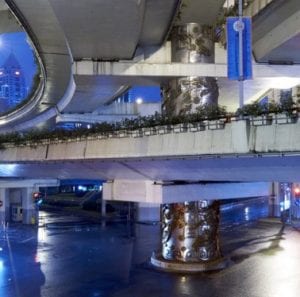
Chinese myths have dragons that sleep, exposed by excavating boys trying to end droughts – or just being clumsy. The dragon unleashes a storm or a lightning blast. Manipulating weather is the specialty of the Chinese dragon.
A year after the accident, Ruihai logistics’ chairman was sentenced to death – but the death part was suspended.
For undeniable disasters, it is crucial to find scapegoats so that the nation can move forward. To disappear into stasis in prison, to decay in situ like Bo Xilai, looks like the ultimate curse. To sit out the conflagration and be prevented from prevented from accelerating or exploding.
In the meantime, Tim and Nora have moved away and (I learn from social media) have had a beautiful baby, and Jack has died. Of liver failure over Chinese New Year, in early 2018. He had asked the manager of the Irish pub on Yongkang Lu where I was; he wanted to see me. I was still in Suzhou when he asked for me. When I got back to town he had already flown to the UK.
Nadia is waiting out the virus, painting and writing in LA, listening to coyotes and watching the White House hatefully. Her eyes are exactly the same.
